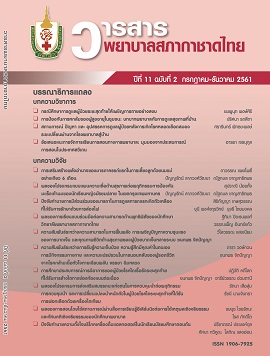Relationships among Illness Perception, Self-Esteem, Physical Activity and Sleep Disturbances in Acute Myocardial Infarction Survivors
Keywords:
acute myocardial infarction, illness perception, sleep, physical activityAbstract
The correlational research aimed to investigate relationships among illness perception, self-esteem, physical activity and sleep disturbances in acute myocardial infarction survivors. One hundred and nine participants with acute myocardial infarction were recruited by purposive sampling. Participants were followed up at the out-patient departments of cardiovascular clinics from King Chulalongkorn Memorial Hospital and Police Hospital. The research included the demographic data questionnaire and the illness data form, a brief illness perception questionnaire, Rosenberg self-esteem scale, Duke activity status index, and general sleep disturbance scale. Data were analyzed using descriptive statistics and Pearson’s product moment correlation coefficient.
The results were as follows: 1) 40.4% of acute myocardial infarction survivors had sleep disturbances; 2) illness perception was positively correlated with sleep disturbances in acute myocardial infarction survivors (r= .666); 3)self-esteem and physical activity were negatively correlated with sleep disturbances in acute myocardial infarction survivors (r= -.425, -.483). It is recommended that the results of this study be used as a foundation for planning and promoting sleep in acute myocardial infarction survivors.
References
2. Blankenship JC, Marshall JJ, Pinto DS, Lange RA, Bates ER, Holper EM, et al. Effect of Percutaneous Coronary Intervention on Quality of Life: A Consensus Statement from the Society for Cardiovascular Angiography and Interventions. Catheter Cardiovasc Interv 2013;81(2):243-59.
3. Alcantara C, Peacock J, Davidson, KW, Hiti D, Edmondson D. The association of short sleep after acute coronary syndrome with recurrent cardiac events and mortality. Int J Cardiol 2014; 171(2):e11–2.
4. Michal M, Wiltink J, Kirschner Y, Schneider A, Wild PS, Munzel T, et al. Complaints of Sleep Disturbances Are Associated with Cardiovascular Disease: Results from the Gutenberg Health Study. PLoS One 2014;9(8):e104324-31.
5. Banack HR, Holly CD, Lowensteyn I, Masse L, Marchand S, Grover SA, et al. The association between sleep disturbance, depressive symptoms, and health-related quality of life among cardiac rehabilitation participants. J Cardiopulm Rehabil Prev 2014; 34(3):188-94.
6. Conden E, Rosenblad A. Insomnia predicts long-term all-cause mortality after acute myocardial infarction: A prospective cohort study. Int J Cardiol 2016; 215:217–22.
7. Howell D, Oliver TK, Keller-Olaman S, Davidson JR, Garland S, Samuels C, et al. Sleep disturbance in adults with cancer: a systematic review of evidence for best practices in assessment and management for clinical practice. Ann Oncol 2014; 25(4): 791-800.
8. Yang PL, Huang GS, Tsai CS, Lou MF. Sleep Quality and Emotional Correlates in Taiwanese Coronary Artery Bypass Graft Patients 1 Week and 1 Month after Hospital Discharge: A Repeated Descriptive Correlational Study. PLoS One 2015;10(8): e0136431-46.
9. Grande MR, Jackson AC, Murphy BM, Thomason N. Relationship between sleep disturbance, depression and anxiety in the 12 months following a cardiac event. Psychol Health Med 2016; 21(1):52-9.
10. Johansson I, Karlson BW, Grankvist G, Eva B. Disturbed Sleep, Fatigue, Anxiety and Depression in Myocardial Infarction Patients. Eur J Cardiovasc Nurs 2010; 9(3):175-80.
11. Orwelius L, Nordlund A, Edell-Gustafsson U, Sjoberg F. Prevalence of sleep disturbances and long-term reduced health-related quality of life after critical care: a prospective multicenter cohort study. Crit Care 2008; 12(4): R97. doi: 10.1186/cc6973.
12. Rod NH, Vahtera J, Westerlund H, Kivimak M, Zins M, Goldberg M, et al. Sleep Disturbances and Cause-Specific Mortality: Results From the GAZEL Cohort Study. Am J Epidemiol 2010; 173(3):300-9.
13. สายสุนีย์ ทับทิมเทศ, จักรกฤษณ์ สุขยิ่ง, สมจิต พฤกษะริตานนท์. ปัญหาการนอนหลับของผู้ป่วยนอกที่หน่วยตรวจโรคปฐมภูมิ. วารสารจดหมายเหตุทางแพทย์ แพทยสมาคมแห่งประเทศไทย ในพระบรมราชูปถัมภ์ 2552; 92(2):273-78.
14. Edell-Gustafsson UM, Svanborg E, Swahn EA. gender perspective on sleeplessness behavior, effects of sleep loss, and coping resources in patients with stable coronary artery disease. Heart Lung 2006; 35(3):75-89.
15. Andrechuk CR, Ceolim MF. Sleep quality in patients with acute myocardial infarction. Texto Contexto Enferm 2015;24(4):1104-11.
16. Broadbent E, Petrie JK, Mani J, Weinman J. The Brief Illness Perception Questionnaire (BIPQ). [Internet]. 2016 [cited 2016 Dec 5]; Available from: http://www.uib.no/ipq/html/b-ipq.html
17. ทินกร วงศ์ปการันย์, ณหทัย วงศ์ปการันย์. A Comparison of Reliability and Construct Validity between the Original and Revised Versions of the Rosenberg Self-Esteem Scale. วารสารสมาคมจิตแพทย์แห่งประเทศไทย 2555;9(1):54-8.
18. ทิพนันท์ ปันคำ. ปัจจัยทำนายพฤติกรรมสุขภาพของผู้ป่วยที่ได้รับการใส่เครื่องกระตุ้นหัวใจแบบถาวร [วิทยานิพนธ์ปริญญาพยาบาลศาสตรมหาบัณฑิต]. กรุงเทพฯ: จุฬาลงกรณ์มหาวิทยาลัย; 2558.
19. ปานจิต นามพลกรัง. ปัจจัยที่สัมพันธ์กับพฤติกรรมการออกกำลังกายของผู้ป่วยโรคหลอดเลือดหัวใจ. [วิทยานิพนธ์ปริญญาพยาบาลศาสตรมหาบัณฑิต]. กรุงเทพฯ: จุฬาลงกรณ์มหาวิทยาลัย; 2547.
20. นฤมล นุ่มพิจิตร, ฉัฐยา จิตประไพ, วิศาล คันธารัตนกุล, เพิ่มสุข เอื้ออารี, กนกกาญจน์ กอบกิจสุมงคล. ผลของขบวนการเวชศาสตร์ฟื้นฟูสมรรถภาพหัวใจระยะที่ 2 และปัจจัยที่มีความสัมพันธ์ต่อบทบาทการออกกำลังกายในผู้ป่วยโรคหัวใจของโรงพยาบาลรามาธิบดี. รามาธิบดีพยาบาลสาร 2543; 6(2);142-61.
21. Lee KA. Self-reported sleep disturbances in employed women. Sleep 1992;15(6):493-8.
22. Colagiuri B, Christensen S, Jensen AB, Price MA, Butow PN, Zachariae R. Prevalence and predictors of sleep difficulty in a national cohort of women with primary breast cancer three to four months postsurgery. J Pain Symptom Manage 2011;42(5):710-20.
23. Fares A. Night-time exogenous melatonin administration may be a beneficial treatment for sleeping disorders in beta blocker patients. J Cardiovasc Dis Res 2011;2(3):153-5.
24. Alsen P, Brink E, Persson LO, Brandstrom Y, Karlson WB. Illness Perceptions After Myocardial Infarction Relations to Fatigue, Emotional Distress and Health-Related Quality of Life. J Cardiovasc Nurs 2010;25(2):e1-10.
25. Park MW, Kim JH, Her SH, Cho JS, Choi MS, Gweon TG, et al. Effects of Percutaneous Coronary Intervention on Depressive Symptoms in Chronic Stable Angina Patients. Psychiatry Investig 2012;9(3):252-6.
26. วรุตม์ อุ่นจิตสกุล, พิเชฐ อุดมรัตน์. ความคิดรู้และพฤติกรรมบำบัดสำหรับภาวะนอนไม่หลับ. วารสารสมาคมจิตแพทย์แห่งประเทศไทย 2559;61(1):89-106.
27. กาญจนรัตน์ คำเพชรดี, วัลภา สบายยิ่ง, นิรนาท แสนสา. ปัจจัยที่มีผลต่อความภาคภูมิใจในตนเองของผู้สูงอายุที่อาศัยอยู่ในจังหวัดอุบลราชธานี. [วิทยานิพนธ์ปริญญาศิลปศาสตรมหาบัณฑิต]. กรุงเทพฯ: มหาวิทยาลัยสุโขทัยธรรมาธิราช; 2558.
28. ประไพวรรณ์ ศรีเมธาวรคุณ, ขนิษฐา นาคะ, ประนอม หนูเพชร. กิจกรรมทางกายของผู้สูงอายุในชนบทภาคใต้. วารสารสภาการพยาบาล 2553;25(1):112-20.
29. Veqar Z, EjazHussain M. Sleep Quality Improvement and Exercise: A Review. IJSRP. 2012;2(8):1-8.
30. Sands-Lincoln M, Loucks EB, Lu B, Carskadon MA, Sharkey K, Stefanick, ML, et al. Sleep Duration, Insomnia, and Coronary Heart Disease Among Postmenopausal Women in the Women’s Health Initiative. J Womens Health 2013;22(6):477-86.
31. เจริญรัตน์ กระบวนรัตน์. การออกกำลังกายเพื่อสุขภาพ: ความรู้ที่ยังต้องการความเข้าใจ. วารสารโภชนบำบัด 2551;19(2):88-102.
Downloads
Published
Issue
Section
License
เนื้อหาบทความหรือข้อคิดเห็นต่างๆ ในวารสารพยาบาลสภากาชาดไทยนี้ เป็นความคิดเห็นของผู้เขียนบทความ ไม่ใช่ความเห็นของกองบรรณาธิการ หรือสถาบันการพยาบาลศรีสวรินทิรา สภากาชาดไทย






